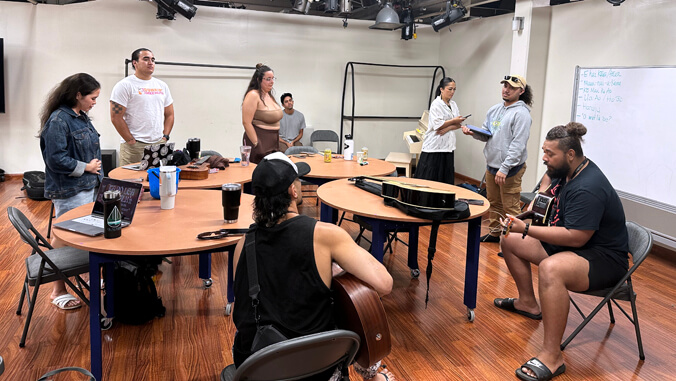
Ten students in the University of Hawaiʻi at Mānoa Hawaiian Theatre program are tapping deeply into their naʻau (gut) to acquire the art of composing mele (songs) rooted in Indigenous traditions. Throughout November, the award-winning program in the theatre and dance department is hosting guest artists from Aotearoa (New Zealand) who are mentoring haumāna (students) at UH Mānoa to write original songs in Hawaiʻi’s native tongue across contemporary genres such as R&B, soul, pop and reggae.
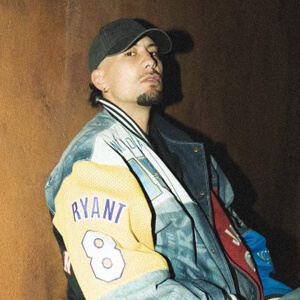
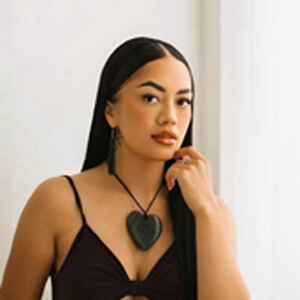
Māori musicians Tawaroa Kawana and Hera Hanita-Paki are known for captivating audiences with their original recordings penned in te reo Māori (Māori language). The Indigenous artists are also immersed in Waiata Māori, a traditional music genre from Aotearoa that is reflective of Māori traditions and beliefs.
“This collaboration is about building capacity in our lāhui (nation) to create and tell our stories in our language through the medium of mele,” said Tammy Hailiʻōpua Baker, professor and founder of the UH Mānoa Hawaiian Theatre Program. [We want our haumāna to] expand their horizons, support their dream and artistic goals ma ka ʻōlelo Hawaiʻi (in the Hawaiian language).”
This artist residency is apart of ʻAhahui Noiʻi Noʻeau ʻŌiwi or ANNO, a research institute for Indigenous performance which is part of a strategic investment initiative awarded by the UH Mānoa Office of the Provost and is comprised of three paths; scholarship and publication, curriculum and archive, and engagement and recruitment. The initiative is geared toward hosting guest artists from Hawaiʻi and Oceania to mentor UH Mānoa students and generate creative research together.
Participating Haumāna
- Kaipulaumakaniolono Baker, PhD English
- Kaʻiukapu Baker, MFA Hawaiian Theatre
- Kamalei Krug, PhD Education
- Kaʻula Krug, MET, College of Education
- Leleapaoʻo Krug, Hawaiian Language
- Ikaika Mendez, MFA Hawaiian Theatre
- Wahine Nahale-a, Dietetics and Hawaiian Studies
- ʻIkaʻaka Nāhuewai, PhD Hawaiian and Indigenous Theatre
- Joshua Kamoaniʻala Tavares, MFA Acting and Hawaiian Theatre
- John Taukave, MA Pacific Island Studies
Hawaiian expression
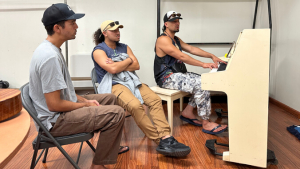
Each of the UH Mānoa students have a foundation in ʻōlelo Hawaiʻi, having attended either primary or secondary schooling at a Hawaiian language immersion school here in Hawaiʻi.
Tavares, an acting and Hawaiian theatre MFA candidate, is an aspiring recording artist and worked closely with Kawana on creating a melody for his mele, ʻO wai lā ʻoe.
“I had that one phrase in my notes and we listened to the melody of a song I currently like by Jhene Aiko and we played with chord progression and melody and came up with something really cool,” Tavares explained. “I felt really blocked but kept trying to open myself up to the experience and I’m glad I did because we came up with a haunting and melancholic sound.”
Kaʻiukapu Baker is a second year MFA Hawaiian theatre candidate who feels fascinated by the entire mele creation process and what she was able to accomplish.
“Going into this process I was completely terrified to write a mele because I had no experience in it,” Baker said. “However, the week of this workshop I had two hooks come to me so I proposed them to Tawaroa and he took them and built two main hooks out of them.”
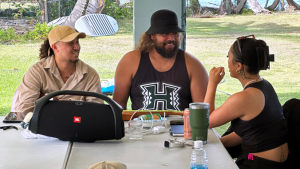
Maui native Mendez is also working on his MFA in Hawaiian theatre. He has appreciated the journey in composing a mele about his home island and the interweaving of Indigenous traditions and perspectives.
“It was interesting to see the difference and similarities in how we approach our composition and arrangements of song. The Māori have such a strong foundation in their language; therefore, allowing them to be free for expression,” Mendez said. “For me, I am still grasping the knowledge of our native tongue to express what I am thinking and experiencing. This definitely allowed me space to be creative and just write!”
Mele debut
The Hawaiian theatre students will perform their compositions at Ka Pō Leʻa o Halāliʻi on Wednesday, November 8, 6–8:30 p.m. at Mānoa Gardens. Kawana and Hanita-Paki will also share a special performance alongside Hawaiʻi musicians ʻIkaʻakamai and Kaʻikena Scanlan. The event is free and open to the public.

